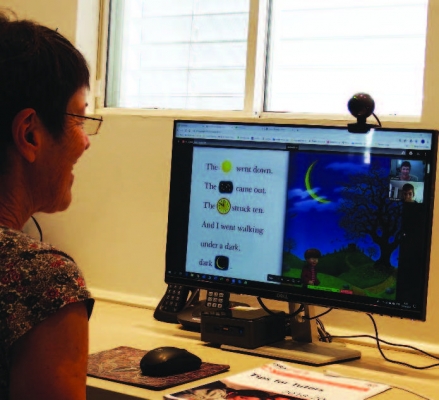Zoom is in a Class of its Own
Three months ago, if you'd have asked me what Zoom was I would have replied that it was a sort of ice lolly that looks like a rocket. Now, since coronavirus, Zoom has become a household word for the way we communicate.
For those who may not know, Zoom is an online tool which lets you talk to many people simultaneously. You can see all their faces in small boxes, hear them in real time, and, very importantly, you can mute and unmute them!
But for some of us who are tutors on ESRA's ETP program (English Tutoring Program), it has become a vital teaching tool.
Until coronavirus, I was the assistant coordinator with Roz Jacobs of the Five Towns ETP program. This involved finding English speaking volunteers who would go into local schools in our area – Zichron Ya'akov, Hadera, Binyamina, Caesarea and Pardes Chana – and using materials supplied by the English teacher, tutor students in schools.
When the virus began we had 33 volunteers in 8 schools. ETP did not just exist in the Five Towns area. It was all over Israel from Eilat to Karmiel and the Golan, and provided opportunities for volunteers who were mainly retired, and most of whom had not taught professionally, to do something fulfilling for a few hours a week.
Then in early March, with lockdown here in Israel, ETP came to a full stop as most of our volunteers are in an older age bracket, and were isolating, and schools closed.
However, gradually schools went online with teachers all over the country learning how to use Zoom.
At the beginning of May, I received a phone call from Bernice Meyers, ETP's National Coordinator, asking if I was interested in tutoring online and in finding some volunteers to do some tutoring too.
A school in Kfar Yona had contacted ESRA and needed help. Their wonderful English teacher, Or Bakshan, realized that when you teach a whole class using Zoom, it's difficult to engage every child and some were definitely not concentrating and were getting left behind.
Bernice asked if I could find some tutors, teach them how to use Zoom and supervise them in tutoring children, either one-on-one or in small groups of two or three.
In order to teach online, tutors needed to know that apart from seeing and talking with others on Zoom, you can show any document, allow students to interact with that document, share YouTube clips and in addition, there's an interactive white board which you can use exactly like an old fashioned blackboard.
There is a word of warning though: children are quicker on Zoom than we older adults are, and if you're not careful they can write all over your documents – so beware.
But at its best, it is very effective. I can for instance show a pre-prepared text and ask the student to circle or stamp an x or heart on any word or picture. I can also roll an online dice and play snakes and ladders.
One month on, and we now have two schools and six tutors all working online using Zoom.The advantage of course is that the tutor can live in Eilat and the student can be in Afula (where our second school is located) and it makes no difference.
We also use Zoom to meet regularly with the tutors and the teachers to share our experiences and to get feedback from the teachers.
Bernice is really supportive, helping us to get this project off the ground and Lola Katz, ETP's Pedagogical Consultant, is supporting us with teaching methodologies and transforming materials so that they are suitable for online use.
We're not sure what the future will be and when we'll feel safe to go back physically into schools.
For some of us this online tutoring might become a way of life and it certainly allows us to offer English tutoring in more remote locations where we might not have any English speaking volunteers nearby.
It's not a perfect system and most of us would prefer face-to-face contact with students so we can feel they're fully engaged in the lesson.
But as Sylvia Harwood, one of our volunteer tutors, said after her first session, "That was great. We talked, read, and he tried writing some of the words from the book that I shared with him. I can already see the spelling problems."
To which the teacher responded with four smiling emojis and the words: "He also really enjoyed it."








Comments